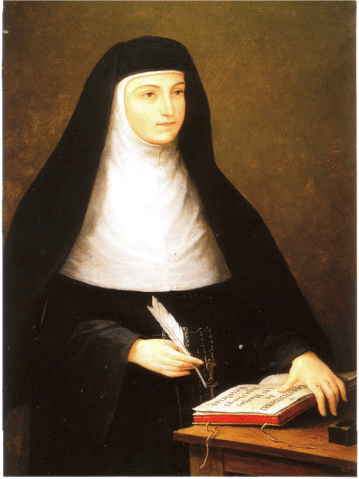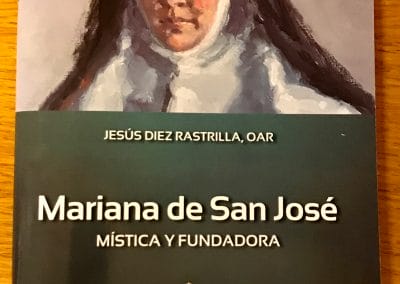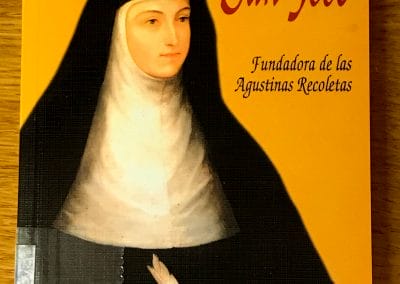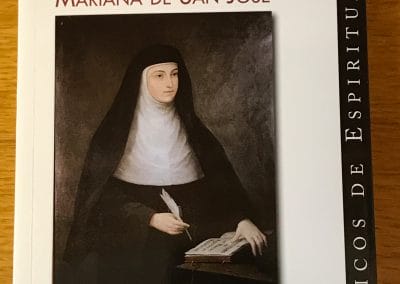Theologians of the Congregation for the Causes of Saints approved on February 14, 2017 the heroic virtues of Mother Mariana de San José (1568 – 1638), founder of the Augustinian Recollect Nuns.
On February 15, 2017, Bishop Carmelo Pellegrino, promoter of the faith of the Congregation for the Causes of Saints, communicated to the Postulator General of the Order, Fr. Samson S. Silloriquez, that the previous day (February 14) During the Congress presided over by the same promoter of the faith, the theologians of the Congregation voted unanimously (9 of 9) in favor of the heroic virtues of Mother Mariana de San José, founder of the Augustinian Recollects Nouns. When the result was known, the theologians themselves expressed with great applause their complacency for this recognition. Among the comments expressed at this Congress it was pointed out that Mother Mariana is a beautiful figure, human and religious, with very important writings.
The opening of the diocesan process for the cause of this Servant of God took place in the madrilenian convent of the Incarnation on April 27, 1993. Three years later, on July 10, 1996, the Closure of the diocesan phase. The meritorious work of the Postulator General of the Order in those years, Fr. Romualdo Rodrigo and Fr. Jesús Díez Rastrilla, who investigated the documents and organized them, must be recognized, especially in the preparation and development of the whole process. The fruit of this work was the careful preparation of the Positio super virtutibus of Mother Mariana, which synthesized the main testimonies of the diocesan process and which would serve as a basis for the study of the cause by the theologians of the Congregation for the Causes of Saints .
Positio was presented in 2007 to the Congregation for the Causes of Saints. It should be borne in mind that a peculiarity of the cause of the Marian Mother of St. Joseph is her “historical” condition, since despite the secular recognition of the Marian Mother’s fame among the Augustinian Recollects, her process of canonization Formally opened more than three centuries and a half after his death. Hence a fundamental requirement was to work properly and scientifically both the biography and the critical edition of his writings. All this had to be presented in due course to a commission of historians appointed by the Congregation of the Causes of Saints, which cast its vote in favor of the historicity of the work on November 30, 2007.
In this sense, it is important to note that after the culmination, in 1996, of the diocesan phase of the process of canonization, there has been a remarkable bibliography on Mother Mariana de San José. It is necessary to emphasize and to recognize the valuable contribution of the Fr. Jesus Diez Rastrilla to the knowledge of the figure and writings of the Mother Mariana. He has devoted many years to the study of these writings and to the careful editing of them. The result of this was the publication of the Complete Works of Mother Mariana de San José in a volume of 1538 pages edited by the Biblioteca de Autores Cristianos (BAC Maior, 115) in 2014. In 2015 Fr. Jesus published a volume of the collection “Lámparas ardientes”, a 96-page booklet titled “Mariana de San José. Mystic and founder”. Finally, in 2016 the BAC published in the Classics Collection of Spirituality, 35, a volume of 309 pages entitled “Mystical Life: experience and story. Mariana de San José. Accounts of conscience and Commentary on the Song of Songs”, critical edition, introduction and notes of Fr. Jesús Diez Rastrilla.
After expressing the favorable vote of the theologians of the Congregation for the Causes of Saints on the heroic virtues of the Marian Mother of St. Joseph, the next step will be to await the evaluation of these virtues by a special commission of Bishops and Cardinals who, On the day appointed by the Prefect of the same Congregation, Angelo Cardinal Amato, will give their vote on the virtues of the Servant of God. Having obtained the favorable vote, as is supposed to be after the theologians, will come the confirmation and declaration of the heroic virtues of the Mother on the part of Pope Francis.
Soon the commission of Bishops and Cardinals will meet. Let us also hope that the Pope will soon declare that the Marian Mother of Saint Joseph lived the virtues with heroicity. After this declaration, and awaiting confirmation of a miracle made through the intercession of the Mother – a requirement for beatification – she may be called “Venerable.”
Biographical data of Mother Mariana de San José
Life and foundations
Mariana de San José was born in Alba de Tormes (Salamanca), on August 5, 1568. At a tender age her mother died. He spent her childhood between Alba de Tormes and Ciudad Rodrigo, with her father and other relatives. In 1577, after her father’s death in 1576, she was taken by her relatives to the convent of the Agustinas of Santa Cruz in Ciudad Rodrigo, where she had two aunts, her father’s sisters, and a sister a little older than her. Two other sisters were in another convent, that of the Franciscans of the Mother of God in Coria (Cáceres). At the age of 18 he gave up any possibility of marriage and took the habit of Agustina. The 21 of February of 1587 made the religious profession.
Her life was not easy in the convent of Ciudad Rodrigo, for God purified it with little proof. Between moments of fervor, temptations, dryness and tribulations, her spirit matured. The austere life, the reading of spiritual books, especially the writings of St. Catherine of Siena, the lives of the saints and the works of St. Teresa, and the penances imposed or sent by the Lord were maturing for the mystical life , Which will grow extraordinarily when it begins the life of recoleta.
The nuns discovered the virtues of Mariana and were chosen first Master of novices and then Prior (1599-1603). Meanwhile the Provincial of the Augustinians of Castile, Fr. Agustín Antolínez, planned to open a convent of Monjas Recoletas. They offered him one in Eibar. Among the four chosen to start the Recollection of the Augustinian nuns was Mother Mariana, who accepted to be part of the group. On 8 May 1603, with three other moja and some young aspirants, the convent of Eibar began its journey. A year later, on May 23, 1604, Mariana professed as Augustinian Recolect and changed her surname to “San Jose”. From now on it will be called Mariana de San José.
A year later, Mother Mariana founded another Recollect monastery in Medina del Campo, followed by others in Valladolid, Palencia and finally the one of the Incarnation in Madrid. Queen Margaret of Austria, who had known her in Valladolid and also knew about the lifestyle she had established in her monasteries, thought of her for the revitalization of the recollect monastery of Santa Isabel, founded by St. Alonso de Orozco. The monastery was going through a crisis. In order to help him overcome it, she took it under her protection and put like Prior Mother Mariana. In June of 1611 the first stone of the monastery of the Incarnation was placed. Unfortunately, the Queen would die shortly thereafter, in October 1611. Her husband, King Philip III, took over the construction of the monastery, where Mother Mariana will be established with the community in July 1616.
The King, in imitation of his wife, and many notables of Madrid and ecclesiastical authorities, including the nuncio of the Pope, visit Mother Mariana for advice. She had a great ascendancy in the community and among the people who visited her, but she lived an austere life and hid the mystical gifts and graces that God gave her. He spent 22 years in the monastery of the Incarnation dedicated to penance and prayer. He died on April 15, 1638.
It was buried in the vault destined to burial of the nuns, and a few years later it was exhumed and placed in a more worthy place. In 1644 her body was recognized by three doctors, who certified that he was incorrupt. Over the years her body has been recognized several times.
Fame of holiness
The Marian Mother of St. Joseph was certainly a great ascetic. Her longing for perfection always incited her to mortify her appetites and choose an austere life: long hours of prayer, mortification in food and sleep, disciplines. God granted him to enjoy mystical gifts and graces, internal communications, change of heart, ineffable experiences, spiritual marriage.
Hes writings and advice accredited it as one of the most distinguished mystics of the Spanish Golden Age, comparable to St. Teresa and St. John of the Cross.





